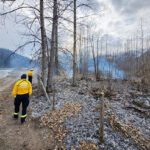Home »

Local water stewards swap stories with Canadian dignitaries
Recently, at a water governance conference in Vancouver, local water champions Paul Christy and Danny Osborne of the Lake Windermere Ambassadors had a chance to rub elbows with former Lieutenant Governor of British Columbia, Iona Campagnolo and Grand Chief Edward John.
Representatives of the Lake Windermere Ambassadors, the Canadian Columbia River Inter-tribal Fisheries Commission, and the Columbia Basin Watershed Network attended the first province-wide gathering to focus on collaborative watershed governance.
Hosted by the Pacific Business and Law Institute, the idea for the event, entitled, ‘Water Gathering: Collaborative Watershed Governance in BC and Beyond’, was inspired by Judge Barry Stuart. Notable delegates included Tom Siddon, Former Federal Fisheries Minister; Iona Campagnolo, Former Lieutenant Governor of British Columbia; and, Grand Chief Edward John, First Nations Summit.
The vision for the gathering was compiled by some of the provinces leading water focused organizations including: POLIS Project on Ecological Governance; Okanagan Basin Water Board; Fraser Basin Council; Water Policy and Governance Group; and, Wildsight.
“We focused on how British Columbians can better protect our watersheds and make sure our communities have a say in water management decisions,” said Paul Christy, Chair of the Lake Windermere Ambassadors.
“Freshwater and functioning watersheds are increasingly important,” Christy added. “Understanding how to best manage them is fundamental to community and economic prosperity.”
“The conference also focused on the role First Nations have within their constitutional rights in making decisions about water in Canada,” said Kenton Andreashuk with the Canadian Columbia River Intertribal Fisheries Commission.
“Collaborative watershed governance is not another layer of government. This is about strengthening the connection between citizens and decision makers,” Christy said. “Effective collaborative governance requires leadership, new approaches and greater opportunities for citizen’s voices to be heard. The Lake Windermere Ambassadors strongly support citizen stewardship, ranging from water monitoring to collaborative decision making.”
Conference delegates agreed that collaboration must be part of the decision-making process when it comes to activities that impact watersheds—such as development, resource extraction and water diversions.
Above photo (left to right): Grand Chief Edward John, Kirsten Harma (Lake Windermere Ambassadors), Kenton Andreashuk and Jim Claircoates (Canadian Columbia River Intertribal Fisheries Commission), Danny Osborne (Lake Windermere Ambassadors), Iona Campagnolo, and Paul Christy (Lake Windermere Ambassadors).







